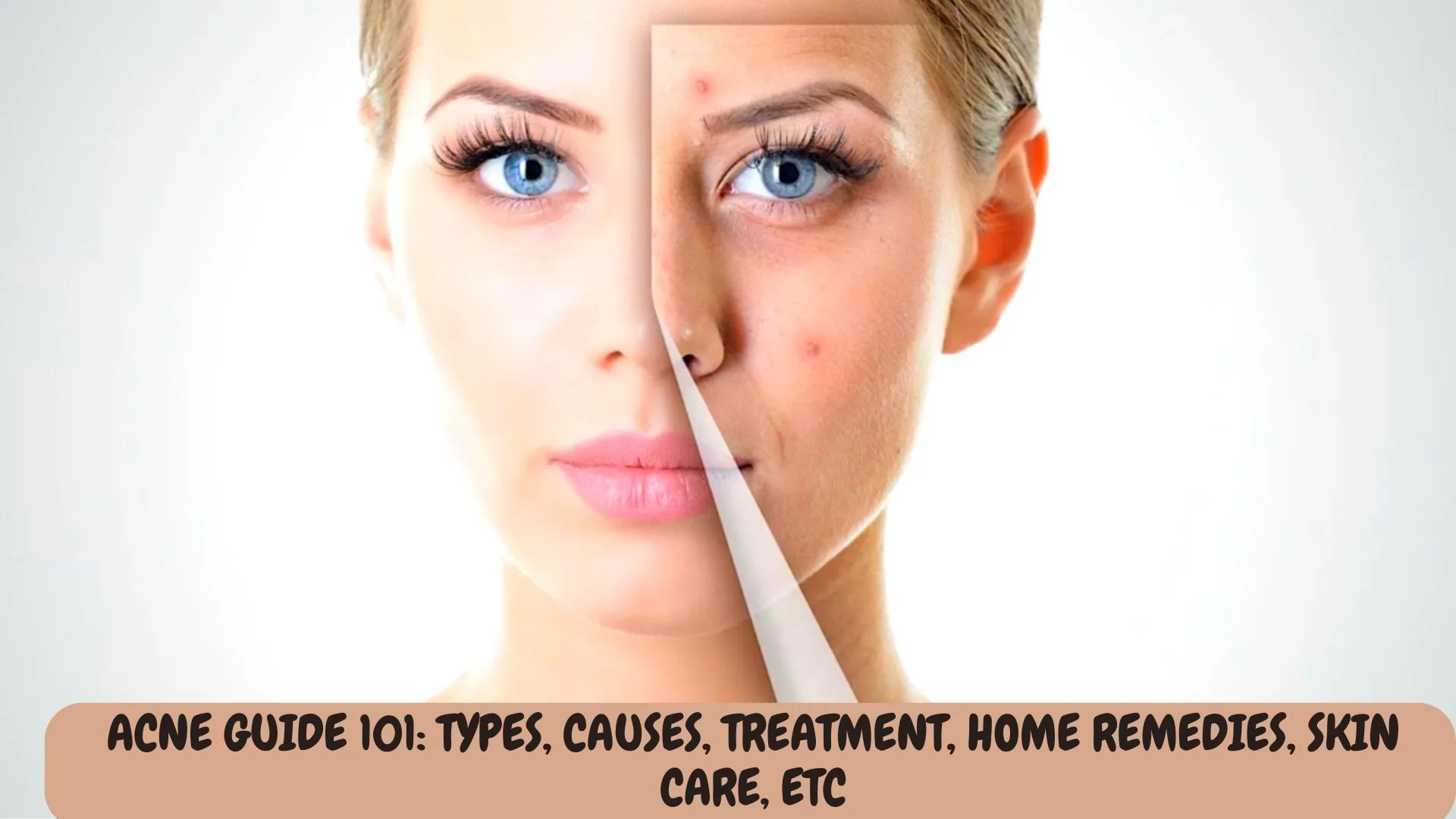 As someone who has suffered from acne for half of her life, I have pretty much knowledge of most of the triggers, types, causes, home remedies, treatment procedures, skincare routine, and medications. So, this article is my personal guide from A to Z of acne that you need to know
As someone who has suffered from acne for half of her life, I have pretty much knowledge of most of the triggers, types, causes, home remedies, treatment procedures, skincare routine, and medications. So, this article is my personal guide from A to Z of acne that you need to know
What is Acne?
According to research, 85% of people between the ages of 12 to 24 have acne-prone skin. However, the age bracket is not specific as people of other ages can also be victims of this. So, what is acne?
Human skin is comprised of millions of pores and hair follicles that are in the form of tiny holes. People with acne-prone skin have pores that are more likely to accumulate dirt or oil (sebum) in the pores. The dirt and oil induce the bacteria which turns the clogged pores into whiteheads, blackheads, pimples, acne, pustules, and cysts.
A more technical explanation of acne formation is as follows. Our skin has sebaceous (oil) glands that are connected to hair follicles. Around the hair follicle, there is a lining of cells called, Keratinocytes. So, the skin goes through a natural procedure of shedding where keratinocytes rise to the surface of the skin and shed naturally. However the problem occurs for people with acne because Keratinocytes are unable to make their way out of the pore and the hair, sebum, and keratinocytes lead to bacteria production inside the pore.
The mixture of hair, sebum, and cells causes inflammation in the skin and these fight for a way out of the skin in the form of red, inflammatory, hurting acne or zits. It is an inflammatory condition that causes pain as well as distress. Since we are aware of what acne is, let’s dive into who gets acne.
Who are Acne-prone People?
There is no specific age group or gender that is likely to get acne. Normally there is a conception that acne comes during teenage and leaves before adulthood. But, it is not always the case. Some people who have a breakout period in their teenage achieve clear skin in adulthood. Others do not have this condition all their life but some triggers in adulthood cause their skin to break out.
During teenage, males are more likely to get acne and it goes away in adulthood. On the contrary, women are more prone to acne in their adulthood due to several factors like makeup, hormonal changes, stress, and others.
Types of Acne
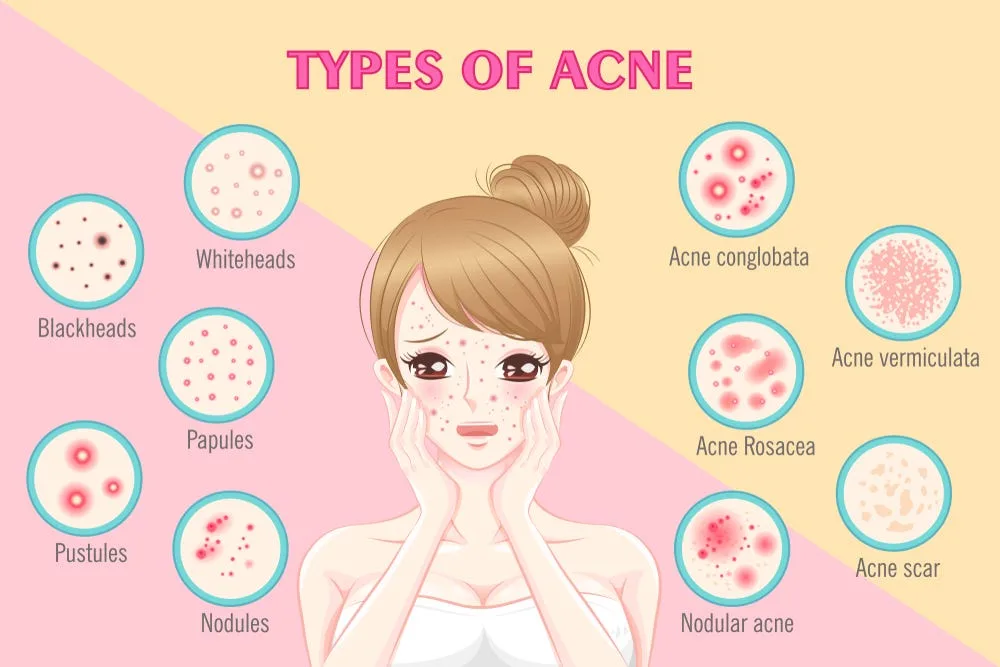
Gather people who have acne and you will notice how one skin is different from the other. This is because several types of acne require special attention. So, if you want to achieve better skin, know your acne better by understanding its types.
- Whiteheads: Whiteheads are a type of comedone that occurs on the surface level of the skin in which oil and cells block the pores.
- Blackheads: Blackheads are comedones that consist of dead skin cells, dirt and oil appearing on the surface of the skin. It can go away through proper cleansing and Over-the-counter treatment.
- Papules: Papules are a form of acne where people have white bumps surrounded by pink or red lining around them. They are inflammatory if squeezed or triggered.
- Pustules: They are also inflammatory pimples with white or yellow puss and a red lining. Squeezing them may result in dark spots and scarring so avoid touching them.
- Nodules: Nodules are painful and inflammatory pimples that build under the surface of the skin. They are large forms of pimples without a head and feel firm on the skin. They take a lot of time to heal but can be treated through medicines.
- Cysts: Cysts are more severe than nodules as they are large, filled with puss, and hurt upon touch. If you have cystic acne, consult a dermatologist.
Causes/ Triggers of Acne
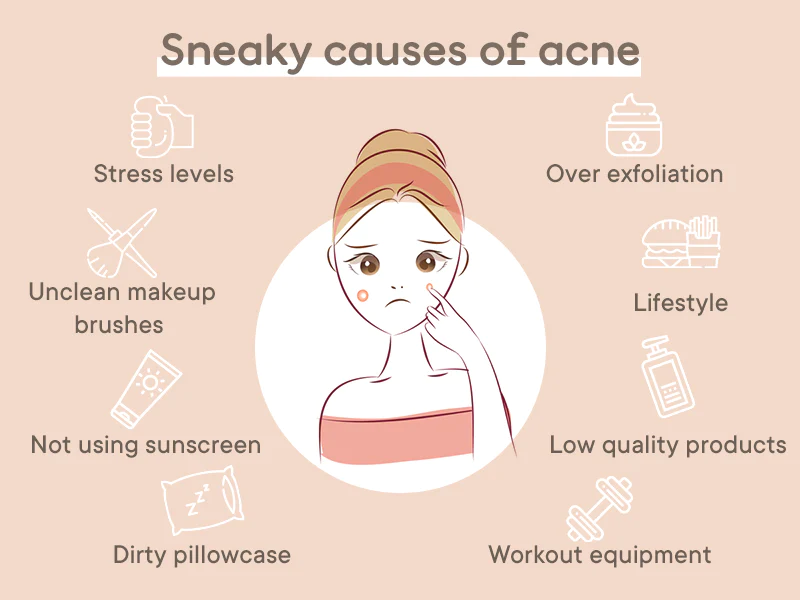
If you are taunted about not taking care of your hygiene due to pimples popping on your face, you need to turn a deaf ear to all those comments. Acne is a condition that can occur due to so many reasons even if you take proper care of cleanliness and hygiene. These are some causes of acne or triggers that cause acne on various parts of your body:
- Hormonal changes
- Passed down in heredity
- Oil-based skincare or cosmetics
- Certain medications and treatments
- Unhealthy diet
- Friction with other surfaces
- Gut issues
- Overexposure with Sun
- Stress and Anxiety
- Smoking
- Low-Quality products
- Disrupted Sleep Schedule
- Poor Hygiene
- Pollution
Medical Treatments for Acne
Medical treatments for acne vary according to the type of acne you have and the severity of it. Before starting any medical treatment, medications, or procedures, you should always consult a physician or a dermatologist who is specialised in treating skin conditions. There are different types of medical treatments for acne:
- Topical Medications
- Oral Medications
- Procedures or therapies to treat acne
Topical Medications
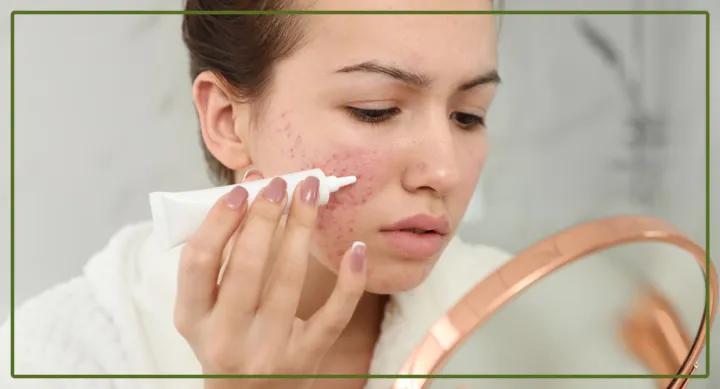
Topical Medications are the prior treatment options that people with acne have. These include medicated gels, creams, and ointments that absorb in the skin, topically, to treat. They range from over-the-counter medicines to doctor’s prescribed medicines and work effectively for mild acne. Topical acne medications like gels, lotions, creams, and ointments work as anti-bacterial that dry out acne, reduce inflammation, and even reduce dark spots. Some of the topical ointments and medicines for acne are:
- Salicylic Acid
- Benzoyl Peroxide
- Tretinoin
- Adapalene
- Azelaic Acid
- Topical Antibiotics
Oral Medications
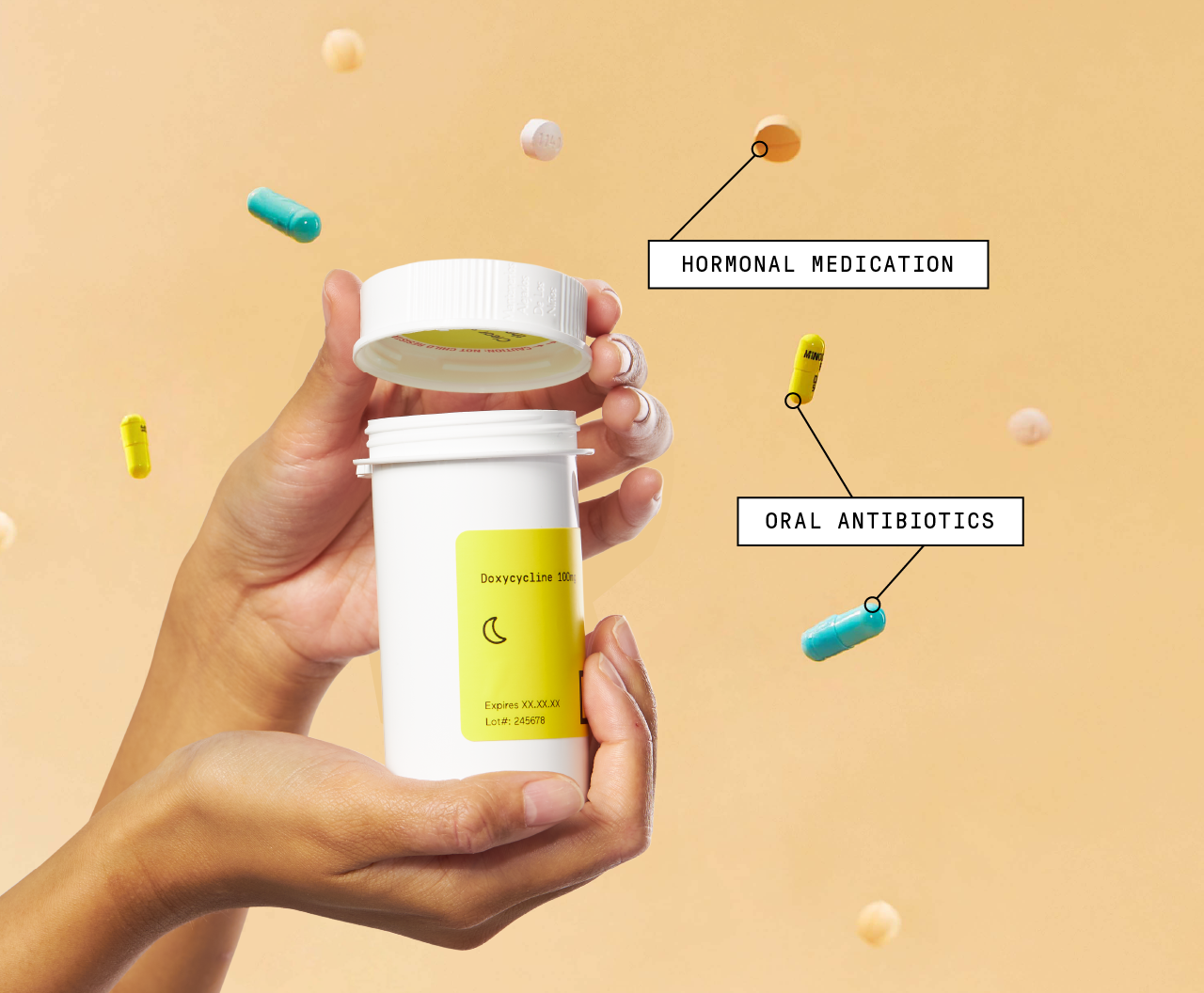
Oral medications are prescribed to treat moderate to severe acne which works best with topical treatments. Before starting any oral medications, it is important to consult a doctor and get a prescription because they vary according to different body conditions. These are systematic treatments that spread around the whole body to treat acne from within that may result in a few side effects so stay in contact with your dermatologist while on medications. Doctors prescribe some of the following oral medications for acne:
- Isotretinoin
- Antibiotics
- Oral Contraceptives
- Erythromycin
Procedures or Therapies to Treat Acne
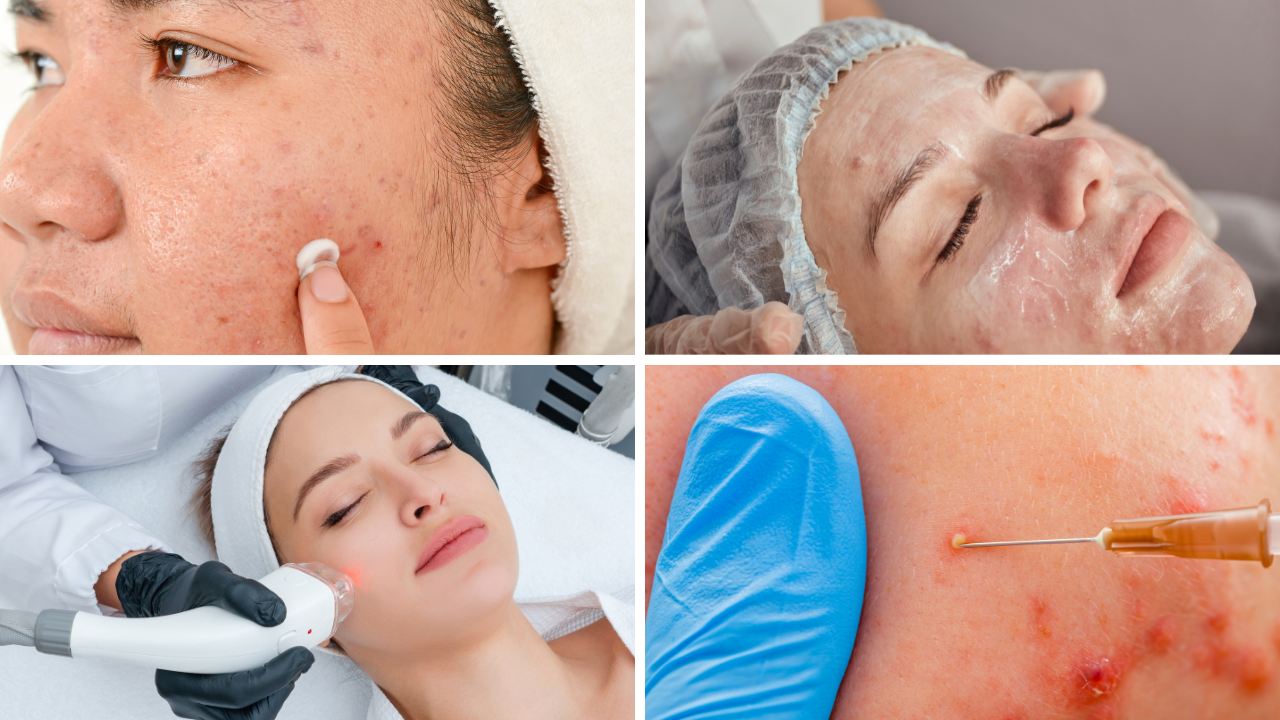
When neither topical nor oral treatments work, what proves to be the last resort are cosmetic procedures or therapies that help in skin healing. A lot of people think that these procedures work like magic and after one session of therapy, you will achieve your glass skin. But, this is a misconception because acne is an internal issue that appears on your skin. It takes around 3-4 sessions to witness a significant change in your skin.
With a lot of cosmetic procedures and medication therapies going on, some proven treatments that work effectively are:
- Chemical peel
- Laser or Light therapies
- Dermabrasion
- Corticosteroid injections
- Drainage and Extraction treatments
Find the Best Dermatologists in Pakistan
Before starting any medications, always consult your doctor so as not to worsen your skin condition. So here are some options:
Home Remedies for Acne
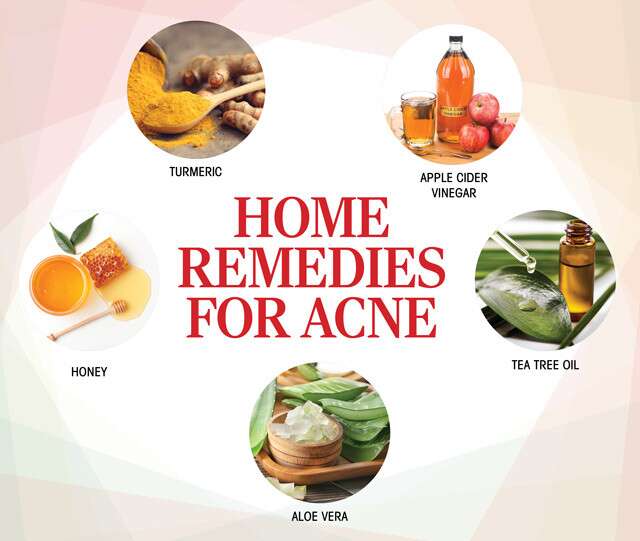
Home remedies for acne work effectively alone or even in combination with other topical and oral medications. They are safe, do-it-yourself, and economical healing procedures that heal your skin naturally. Home remedies are effective when used with consistency as they require weeks and up to months to show visible results. So, make sure whatever remedy you start, you do it with a patch test. If it suits you, swear by it for the rest of your life. If it does not suit you, never use it again because one remedy, suggested by someone, or seen online, may not work for all.
You can try the following home remedies for your acne, pimples, and dark spots issues or turn them into DIY face masks:
- Tea Tree Oil
- Aloe Vera Gel
- Rice Water
- Apple Cider Vinegar
- Honey
- Rice Flour
- Stay Hydrated
- Green Tea
- Gram Flour
- Detoxifying Lemon Water
- Turmeric
- Witch Hazel
- Cinnamon
- Ice Facial
- Rose Water
- Garlic
- Cucumber
Before using any home remedy or DIY face mask, always go for a patch test on your wrist or neck. If it causes any irritation, do not use it. Moreover, if you are using some medical topical medicines, some natural ingredients may not be effective or cause side effects.
Acne-Free Lifestyle
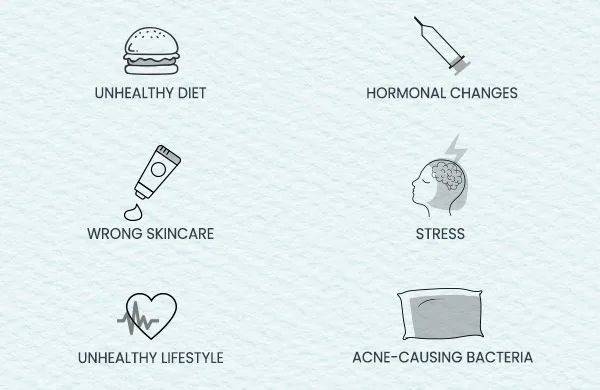
My personal experience has taught me something. No matter how many medicines you take, whatever remedies you use, however expensive your acne-free skin-care products are, you will end up getting acne time and again. Rather than just relying on medicines or home remedies for acne treatment, you need to bring changes in your lifestyle.
Below are some acne-free lifestyle tips that can give you glowing clear skin:
- Reduce Stress
- Go for No-Makeup to minimal-makeup days
- Don’t forget to cleanse your face twice a day.
- Stay Hydrated
- Eat Healthy Food
- Reduce Consumption of Sugary and dairy foods
- Reduce sun exposure
- Moisturize daily
- Manage your sleep schedule
- Never pop your pimples
- Change your bed sets and pillowcases regularly
- Lessen your screen time
- Switch to Acne-friendly skincare and makeup products
Skin Care Routine for Acne
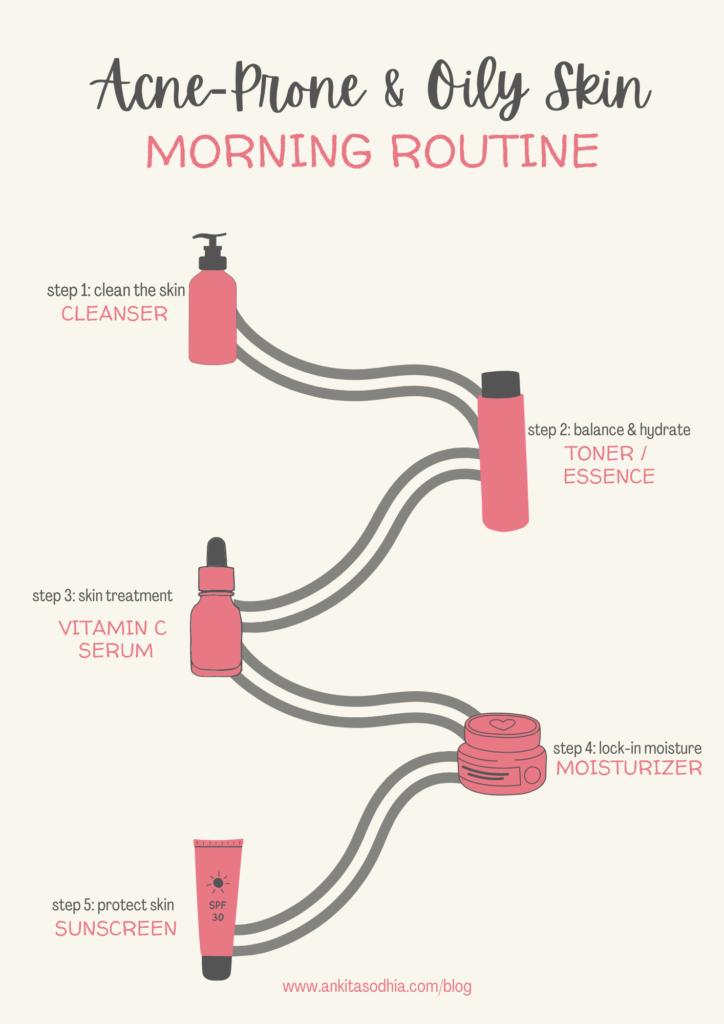
A skincare routine for acne-prone skin can back up your medications and ensure lasting results to achieve clear, glowing, and acne-free skin. If you don’t know where to start, here is a quick routine that everyone with acne can use:
- Opt for a gel-based hydrating cleanser.
- Exfoliate your skin once a week.
- Use a mild toner
- Layer your skin with a suitable skin serum like
- Niacinamide
- Salicylic Acid
- Glycolic Acid
- Vitamin C
- Azelaic Acid,
- Hyaluronic Acid
- Retinol etc.
- Choose a gel-based oil-free moisturizer.
- Also, use retinol products for ageing and other skin issues.
- Never skip a suitable sunblock in the morning even if you are staying indoors.
Skincare products work differently for different people. Serums are important for your skin as they are specially formulated with active ingredients to give your skin whatever it requires. You can try some of the best The Ordinary skin-care serums for healing your skin. So, go for a patch test for a few days to see if any product reacts with your skin.
Diet Plan for Acne
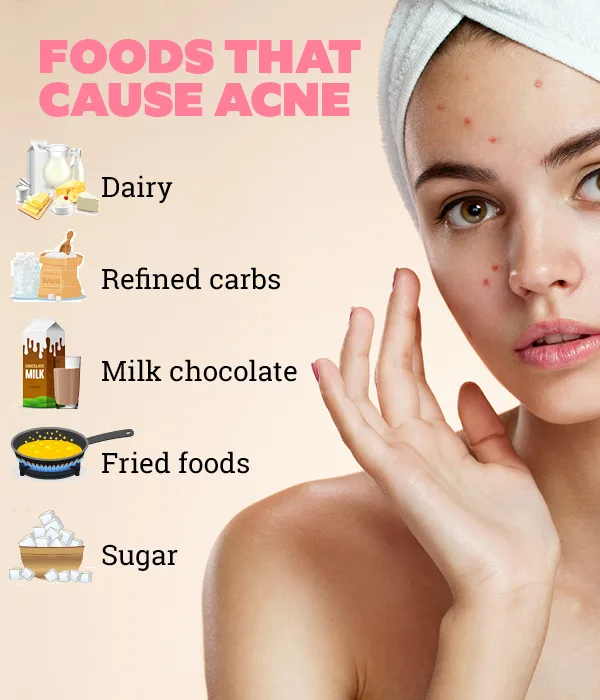
Acne-prone people should be very particular about their diet as there are a lot of food items that trigger their skin issues. To avoid skin issues like acne, hyperpigmentation, and dark spots on your skin, opt for a balanced and healthy diet. Changing your diet is essential for clear skin because it detoxifies the body from bacteria and healing from the inside. Eating healthy does not only bring benefits to your body but your skin appears more fresh and healthy.
So, follow these healthy diet tips for acne to get clear glowing skin:
- Drink more Water
- Add Fresh juices for acne to your diet
- Limit your Dairy products and carb consumption
- Avoid greasy junk food.
- Cut down the sugar content
- Eat more fruits and vegetables.
- Add balance to your diet through protein and nutrition intake by adding lentils, beans, and meat to your diet.
- Avoid High-glycemic foods
Which foods are healthy for your skin?
Eating healthy requires eating the right food for your skin type. You need to eat food items that contain essential nutrients and vitamins like Vitamin A, C and E, antioxidants, Omega-3, Probiotics, and Zinc.
Conclusion
Acne is a common skin issue that encompasses a significant amount of population worldwide. It is important to note, that acne is normal and not a serious disease. With proper care and medication, it can be healed. Moreover, acne is a normal skin condition that doesn’t make anyone inferior because as humans it is natural for many so it is nothing to be embarrassed of.
If you are really concerned about healing acne, knowing the types of acne, home remedies, medications, diet plans, skin-care routines, and lifestyle changes can help bring change to your skin.
